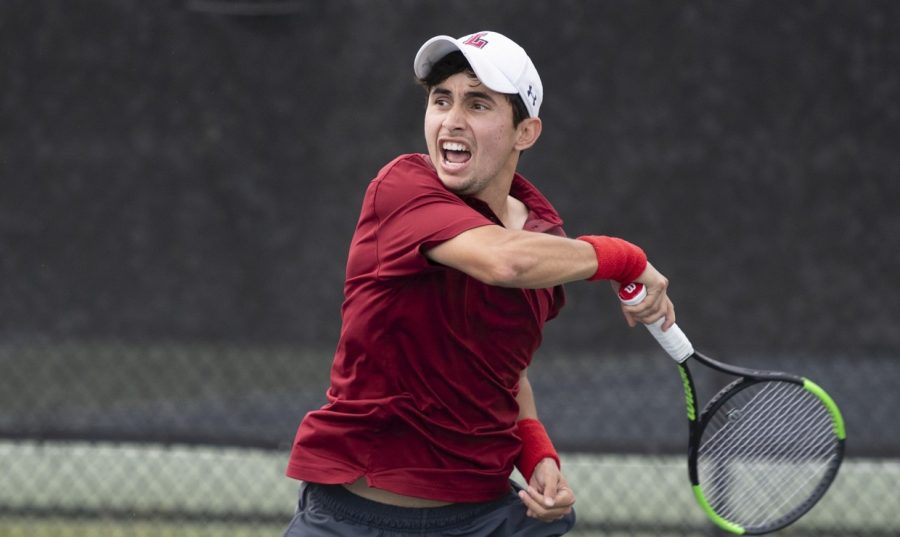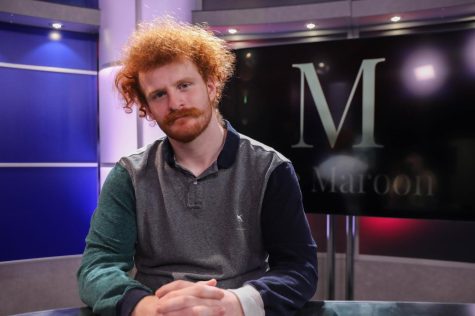Tennis finds talent abroad
Men’s tennis player Ernesto Telles, from San Salvador, El Salvador, battles in match against Jackson State Jan. 25. Telles is one of many international students in the tennis program.
January 30, 2020
International student athletes make up over half of Loyola’s tennis program with seven women and nine men on the teams whose hometowns are outside of the U.S.
The program features athletes from four continents and nine countries, making tennis Wolf Pack Athletics’ most international program.
Although the tennis program stands out in its diversity, the Wolf Pack’s international makeup isn’t unusual in the world of college tennis.
“It’s pretty common. College tennis is especially foreign heavy because tennis is an international sport,” said Matthew Llewellyn, wolf pack tennis head coach. “Unfortunately for the U.S., it’s not one of the most popular sports. It’s probably fifth, sixth, seventh down the pecking order, but in a lot of other foreign cultures, it’s probably second or third.”
While America isn’t a hub for tennis fandom, according to Llewellyn, American colleges have become destinations for young tennis players from around the world because of the opportunities offered by U.S. college athletics.
“Tennis in pretty much every other country doesn’t exist as a college sport,” Llewellyn said.
Llewellyn explained that in most other countries, unless you have professional sponsors, opportunities to play tennis dry up when athletes age out of amateur ranks. American colleges give athletes the opportunity to continue competing while gaining access to all the opportunities an American education provides, according to Llewellyn.
“These kids are really smart about it. They utilize opportunities here to continue getting visas when they’re done,” Llewellyn said. “It gives them an opportunity to stay here and work here in the U.S.,which is pretty cool because it can totally change your family’s trajectory.”
One tennis player who made the journey across the Atlantic to continue his tennis career is Aubin Duchier, a sophomore from La Cadière-d’Azur, France. In his youth, Duchier said he tried his hand at many different sports but liked tennis best.
“In tennis, I started to play in tournaments, and I was good,” Duchier said. “I used to be very good in soccer. I think I could be a professional if I was still playing, but I prefer tennis.”
As Duchier’s aspirations grew, so did his commitment. Duchier began to devote nearly all of his time to tennis, switching from in-person to online schooling in order to have more time on the court.
“I went to my club everyday from 8 a.m. to 8 p.m.,” Duchier said. “It was more like tennis then school, when before it was school then activities after.”
Duchier’s ultimate goal is to be a professional tennis player, but his struggles with injury have made that difficult.
“My goal in tennis is to be a professional. It’s still my goal, but since five years ago, I’ve had a lot of injuries. Sometimes, it’s been ten months, a year, I think my best year, it was at least six months where I couldn’t play,” Duchier said.
When it became clear that he wouldn’t have sponsors to turn professional on his own, Duchier began the process of college recruitment. He, like many international tennis players, purchased the services of a recruiting agent who served as middleman between Duchier and college coaches.
“I’m on bad terms with my agent,” Duchier said. “He tried to sell me dreams. When I told him I wanted to be a professional, he said, ‘Yeah, it’s a good opportunity, you have to do that.’ Then, one week ago he told me ‘Why do you want to be a professional? You’ll never be a professional!’”
Duchier paid his agent 3,000 euros for his services, roughly $3,300, and while he respects the utility of working with someone who understands the American university system, he’s not sure he’d take the same route again.
“I preferred to do it, but now, maybe I regret it,” Duchier said.
In addition to injury and agents, Duchier said the most daunting challenge he has faced has been language.
“When I came here, I didn’t know how to speak English,” Duchier said. “Last semester was terrible. I couldn’t speak with people. The worst was to listen, I couldn’t understand, so I couldn’t answer people.”
Despite taking his classes in what to him was a foreign language, Duchier maintained a 4.0 GPA in his first semester at Loyola, receiving commendation from the athletic department at the 2020 Hall of Fame induction ceremony.
Athletes like Duchier find themselves maneuvering in unfamiliar territory, far from home and far from family. According to Duchier, however, that doesn’t stop them from succeeding.







